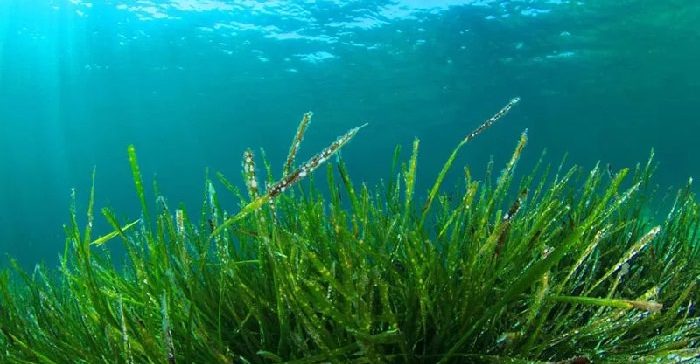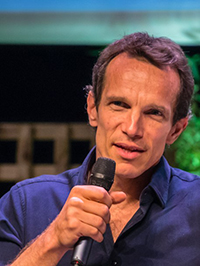Lloyd’s Register (LR) Foundation is an independent, global charity, owned by Lloyd’s Register Group, that helps to protect life and property at sea, and support education, and engineering-related research. In 2015, LR Foundation started the Safe production Of Marine plants and use of Ocean Space (SOMOS) project, a very disruptive project alongside Wageningen University. The project aims to develop seaweed production in offshore wind farm areas in order to contribute to a more responsible food supply chain.
With the planet’s population reaching almost 8 billion, food production from land has reached full capacity. It is now undeniable that within the current system, producing sustainable food for the world of tomorrow will be a real challenge. 10,000 years ago, humans began to shift from the pre-historic model of hunting and gathering to agriculture and the rearing of cattle. However, the same process has not yet happened in our oceans and we are still in the very early stages of aquaculture development. Although the planet’s oceans cover 70% of the planet, they contribute to less than 5% of our diet. Amongst the various ocean production opportunities, seaweed could be a revolution for the food supply chain.

Seaweed has been collected as food for centuries in multiple countries such as Ireland, China, Korea, Japan, and Iceland. Already 24 million tons of seaweed are sold on the food market (including 70% from China, which is however of quite poor quality). These 24 million tons of food do not require any energy, chemical or water input and do not compete with any land production. However logistics, multiple and competing uses of the sea space (tourism, shipping, fishing, oil, etc) as well as safety issues have, until now, limited the large scale production and development of a real “seagriculture”. Meanwhile, intensive farming at sea would present significant opportunities, for example:
a) Protein: Seaweed is one of the world’s most sustainable sources of protein relying on sun, and our abundance of salt water – of which our planet has a lot. Seaweed thrives in its own natural habitat. Only 2% of the vast ocean space would be necessary to feed 12 billion people with sufficient protein, with no need for an additional plant based or animal protein.
b) GHG reduction: An additional benefit from seaweed is its ability to absorb damaging GHG emissions. Currently 30% of these emissions are absorbed by seaweed. Put simply, the more seaweed we grow, the more GHG will be absorbed, thereby helping to mitigate the harmful effects of climate change. For centuries, Iceland and Japan have been feeding livestock with seaweed and have noted that it improves their digestion and consequently improves meat production. They did not know however that feeding them with seaweed limits their methane emission when compared to soy or maize feed. Recent studies have shown that feed based on the asparagoptis seaweed has proved to be a very efficient way of decreasing methane emissions from cows by 99%. It may sound astounding, but to put this into context, this would be equivalent to stopping every car on the planet overnight in terms of comparable GHG emissions.
c) Water: Seaweed is the only vegetable grown in salt water but it has a natural desalination process. This means that fresh water can be produced from seaweed when it is squeezed, thereby making it a valuable source of drinking water, juice or irrigation for those areas of our planet affected by drought.
d) Edible or compostable packaging: Ultimately, more and more projects are using seaweed as a sustainable source of biodegradable (and possibly edible) packaging to replace plastic and the tragic effects that it has on our environment.
e) Medicine, biofuel, cosmetics, ecosystem oxygenation & cleaning, etc.
The LR Foundation research project is now finalised and has been converted in to a real pilot programme thanks to EU Funding as part of the Blue Growth Initiative H2020. Project (20 M€) is to build 2 real demonstrators of multi-use of the ocean and start using wind farms to pilot intensive seaweed production in an offshore area providing that:
- Those areas are restricted which avoids parallel activities
- Windfarm infrastructure could be used to attach the ropes and grow seaweed
- The presence of iron from windfarm infrastructure is likely to boost seaweed production
- It offers obvious cost benefits
This type of disruptive change in our existing production models, is highlighted amongst others in the Lloyd’s Register Foundation Foresight Review of Food Safety, to be released in Rome next October. These findings should ultimately support seaweed to play an essential role in the food of tomorrow as one of the key enablers to feed a growing global population with a safe and sustainable source of protein.
I look forward to sharing more about the merits of seaweed protein production at this year’s Sustainable Retail Summit in October, where I will be speaking during the Fit for Future track on Day 2 of the event.
This post was written and contributed by:
Vincent Doumeizel
Director – Food Programme
Lloyd’s Register Foundation (Charity)


